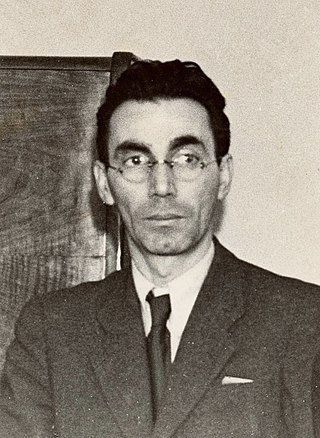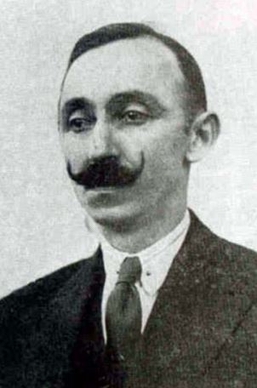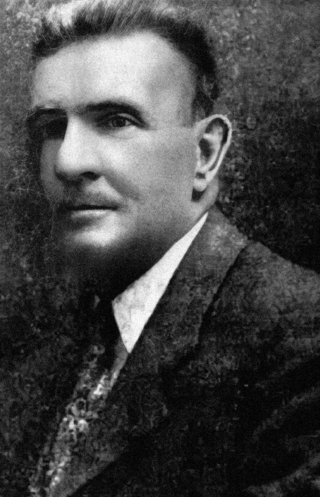Related Research Articles

Zog I was the leader of Albania from 1922 to 1939. At age 27, he first served as Albania's youngest ever Prime Minister (1922–1924), then as president (1925–1928), and finally as king (1928–1939).

In Albania, World War II began with its invasion by Italy in April 1939. Fascist Italy set up Albania as its protectorate or puppet state. The resistance was largely carried out by Communist groups against the Italian and then German occupation in Albania. At first independent, the Communist groups united in the beginning of 1942, which ultimately led to the successful liberation of the country in 1944.

The House of Zogu, or Zogolli during Ottoman times and until 1922, is an Albanian dynastic family whose roots date back to the early 20th century. The family provided the first president and the short-lived modern Albanian Kingdom with its only monarch, Zog I of Albania (1928–1939).

Ali Kelmendi was a Kosovar Albanian communist, an organizer of the communist movement in Albania and was posthumously a Hero of Albania under the communist government.

The Balli Kombëtar was an Albanian nationalist, collaborationist, and anti-communist resistance movement during the Second World War. It was led by Ali Këlcyra and by Midhat Frashëri. The movement was formed by members from the landowning elite, liberal nationalists opposed to communism, and other sectors of society in Albania.
Riza Kryeziu (1847-1917), known as Riza Bey Gjakova, was an Albanian nationalist figure and guerrilla fighter, an influential bey in the Gjakova region, then part of the Vilayet of Kosovo, Ottoman Empire, and one of the activists of Albanian national movements of early 20th century.

Abas Ermenji was an Albanian politician, historian and nationalist fighter with social democratic views who opposed the Albanian Monarchy and Communism.

The National Liberation Movement, also translated as National Liberation Front, was an Albanian communist resistance organization that fought in World War II. It was created on 16 September 1942, in a conference held in Pezë, a village near Tirana, and was led by Enver Hoxha. Apart from the figures which had the majority in the General Council it also included known nationalists like Myslim Peza. In May 1944, the Albanian National Liberation Front was transformed into the government of Albania and its leaders became government members, and in August 1945, it was replaced by the Democratic Front.

Llazar (Zai) Fundo was an Albanian Communist, later social-democratic journalist and writer. He was a former member of the Comintern and the Balkan Communist Federation. He was associated with the Fan S. Noli government in 1924 and became the leader of the Bashkimi organization after the death of Avni Rustemi in 1924. In 1928 he helped establish the Korçë Communist Group. In the fierce rivalry for power control within the Communist Party, he was branded a Trotskyist and purged from the party.

Xhafer Deva was a fascist Kosovo Albanian politician during World War II. A notable local politician in Kosovo and in Axis-occupied Albania, he took charge of German-occupied Mitrovica and worked with the Germans to establish a pro-German Albanian government in Kosovo. Following the capitulation of Italy from the war, he helped form a provisional government under German occupation and set up the Second League of Prizren alongside other Albanian nationalists.

Abaz Kupi or Abas Kupi. He was also known as Bazi i Canës. He was an Albanian military officer.

The Committee for the National Defence of Kosovo was an Albanian organization founded in Shkodër on 1 May 1918. It mainly consisted of the political exiles from Kosovo and was led by Hoxha Kadri from Pristina. It had existed in looser form since May 1915.

Ceno Kryeziu (1895–1927), also known as Ceno beg (Bey) Jakova, was an Albanian political figure of the 1910s, 1920s. He was a member of the notable Kryeziu family from Gjakova, known to be trusted by Yugoslav authorities inside Albanian political circles.

Gani Bey Kryeziu was a Kosovo Albanian anti-communist resistance fighter.
The Kryeziu family was notably powerful and influential in Gjakova and other parts of Dukagjin during the 19th and 20th century. They were part of the Ottoman cast. The family name comes from the Albanian word for Blackhead.

Salih bej Vuçitërni was an Albanian political figure and royalist.

Ismet Bey Kryeziu (1889–1952) was an Albanian political figure during the 1930s and 1940s.

Ferhat Bey Draga (1880–1944) was a noted Kosovo Albanian politician during the Balkan Wars and World War I and Axis collaborator during World War II.
"Free Albania" National Committee, also known as "Free Albania" National-Democratic Committee, also National Committee for a Free Albania or NCFA, was a political organization of post-World War II Albanian emigres based in the Western countries. It was supported by the CIA as part of the Albanian Subversion and was a member of the National Committee for a Free Europe. The committee's aim was organizing the Albanian diaspora and cooperating with western powers in overthrowing Enver Hoxha's Communist regime in Albania.
The committee's creation was initiated in Rome and was completed in Paris in the summer of 1949.
Kryeziu is an Albanian surname.
References
- 1 2 Robert Elsie (24 December 2012), A Biographical Dictionary of Albanian History, I. B. Tauris, p. 262, ISBN 978-1780764313 , retrieved 2013-10-13
- ↑ Obituaries: Said Bey Kryeziu; Albanian Exile, 82, NY Times, May 19, 1993, retrieved 2013-10-13